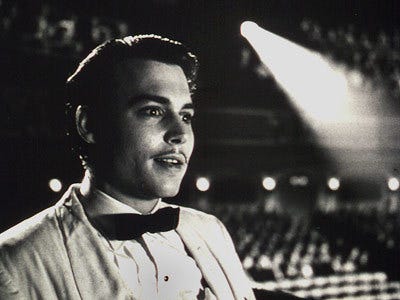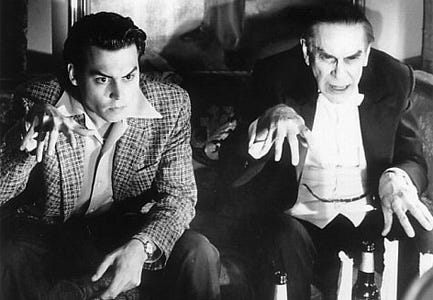The Burton Binge: "Ed Wood"
Each Sunday with “The Burton Binge,” Sam Watermeier will look back at one of Tim Burton’s films, ultimately tracing the return to the auteur’s roots with the October 5 release of “Frankenweenie,” an animated adaptation of Burton’s first live-action short film.

To many critics, “Ed Wood” is Tim Burton’s mark of legitimacy — his big, beautiful step into biographical, black-and-white, Oscar-friendly territory. While the film is a little more elegant than his previous work, it is no less Burtonian. The man’s kooky sensibility is on full display in what may be his most personal, autobiographical work — the tale of a director who, like Burton, wears his eccentricity on his sleeve (quite literally as the guy had an Angora sweater fetish!)
Most know the titular character by his 1959 film, “Plan 9 from Outer Space,” the “Citizen Kane” of bad movies. As schlocky as Wood's films are, it’s difficult to criticize them due to the endearing childlike exuberance with which they are infused. Watching his films and Johnny Depp’s portrayal of his on-set persona, you get the sense that he made movies the way a boy plays mad scientist. With his wide, ever-glistening eyes, Depp embodies Wood’s innocence and wonder.
Just as “Ed Wood” oozes with dark quirkiness beneath its glossy sheen, the character discovers dirt under Hollywood’s veneer. Early in the film, he finds his childhood hero Bela Lugosi shopping for coffins — not in fulfillment of his “Dracula” image, but in preparation for death.

Washed up and heroin-addled, Lugosi is a haunting sight. Under heavy, grizzled makeup, Martin Landau’s eyes gleam with a faint twinkle, making Lugosi seem like a corpse brought to life.
Much of the film is imbued with the same somber magic. Take the scene in which Wood films Lugosi fighting with a rubber octopus. At once surreal and sad, it’s a perfect example of someone struggling to find magic within the mundane — the notion in which all of Burton’s films are rooted. As Lugosi wrestles the creature in a pitifully shallow pond, we see two cases of sympathetic desperation — Lugosi’s urge to live up to Wood’s childhood dreams and the director’s desire not only to fulfill them, but to transport Lugosi back to his glory days in the process.
Although not a box office success, “Ed Wood” was well acclaimed. Landau earned a much-deserved Academy Award for Best Supporting Actor, and the film made many critics’ Top 10 lists.
Next to “Edward Scissorhands,” "Ed Wood" is easily Burton’s most personal and heartfelt film, a movie he seemed destined to make. Oddly enough, he followed it with the least personal films of his career. (Many mark "Ed Wood" as Burton's peak, and while I used to disagree in the hopes that Burton would return to glory, they may be right. We'll see.)
In the weeks to come, I will track Burton's descent, which started slow, with enjoyable, minor kitsch-fests like "Mars Attacks!" and "Sleepy Hollow" and plummeted with his trip to the planet of you-know-what.
As Lugosi would say: Take care, and beware.


